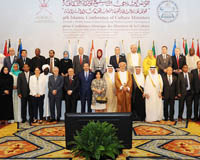Contact Center
.
02 November 2015
H.E Shaikha Mai attends the 9th Islamic Culture Minister's Conference In Oman and Muharraq chosen as the Capital of Islamic Culture 2018


In an effort to improve the cultural role and in response to the need to set intellectual rules and anchor Arab common achievements, H.E. Shaikha Mai bint Mohammed Al-Khalifa, president of Bahrain Authority for Culture & Antiquities (BACA), attended on 2nd November 2015 the 9th Islamic Conference of Culture Ministers held in Muscat, Oman. The Sultanate is hosting the three-day conference as part of its program to celebrate Nizwa as the capital of Islamic culture. The conference is based on the theme, ‘Towards Intermediary Developmental Culture for the Advancement of Islamic Societies’. Participants discussed inter-cultural dialogue and empowering youth to interact more in the culture of dialogue and role of sustainable development. They also agreed on the nomination of Muharraq as the ‘Capital of Islamic Culture 2018’. The selection of the theme of the conference was in line with the major civilized role being played by the Sultanate in disseminating the culture of peace and harmony, while rejecting extremism and hatred among various nations.
The Bahrain Authority for Culture & Antiquities (BACA) president said, “The kingdom of Bahrain, with its deeply-rooted history and cities, has managed to invest its universal human civilization and sustainable cultural tourism.” The audience approved Muharraq as ‘Capital of Islamic Culture 2018’ given its rich cultural and historical heritage as well as its embodiment of the sustainable development fundamentals. Indeed, Muharraq, the former capital of Bahrain, is well known for its cultural contributions through the many restored traditional Bahraini houses that can be found amidst the narrow lanes and byways.
Al-Hidaya al- Khalifia School and Sheikh Isa bin Ali House are Bahrain’s most impressive examples of Gulf Islamic architecture in addition to Sheikh Ebrahim bin Mohamed Al-Khalifa Center for Culture and Research, which provides an important insight into several particularly interesting aspects of Bahrain’s heritage. H.E added that Muharraq will also host Bahrain’s pavilion, presented at the Milano Expo 2015, entitled ‘Archaeologies of Green’ which will be dismantled and re-assembled in front of and Sheikh Isa bin Ali House to bear witness to Bahrain’s deeply-rooted agrarian history.
H.E Shaikha Mai also stressed Bahrain’s success in taking advantage of its rich heritage and glorious civilization to ensure sustainable development and a vibrant cultural tourism sector. It was H.E’s wish to establish a number of institutions that would help realize her cultural vision of Bahrain. This resulted in a plethora of activities and projects spanning heritage conservation, the construction of museums, artistic and scientific centers and other cultural hubs. The strategy even resulted in the setting up systematic investments in culture strategy that would promote and reflect cultural values in the Bahrain. The interaction between Islamic and other cultures was also actively encouraged by this cultural strategy.
H.E added that appointment of Muharraq as ‘Capital of Islamic Culture 2018’ signifies the kingdom of Bahrain’s prominent role in the preservation, promotion and dissemination of culture in a way that has an impact at a local level and across Arab, Islamic and international arenas. Through a combination of historical, established features and an abundance of annual or one-off cultural activities including festivals, book fairs, exhibitions and theatre productions, Muharraq is responsible for improving the cultural experiences of many individuals and groups within the Islamic community.
The conference was chaired by His Highness Sayyid Haitham, in the presence of Dr. Abdulaziz bin Othman Al Tuwaijri, director general of the Islamic Educational, Scientific and Cultural Organization (ISESCO), ministers of culture from the Islamic world and heads of delegations of countries. The main aim of celebrating Islamic cities as cultural capitals is to revive their cultural and scientific contributions to the building of the present and future, His Highness Sayyid Haitham bin Tariq Al Said, Minister of Heritage and Culture, stated. Dr Abdulaziz Othman Altwaijri, the director general of the Islamic Educational, Scientific and Cultural Organization (ISESCO), stated that the critical context of the Muslim world today, with its multifaceted problems and crises, requires the Islamic world to consolidate Islamic solidarity by entrenching its foundations and expanding its scope, to turn it into a broad-based platform for countering the many threats and dangers looming over us, while safeguarding the religious and cultural integrity of Member States, preventing all forms of interference in their own affairs, and ensuring respect for their confessional diversity.







